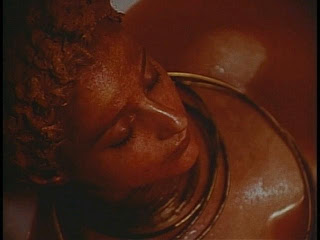Don’t Ring the Doorbell
 1978
1978Dir. Karen Arthur
AKA The Mafu Cage
Deviation,
My Sister, My Love
The Cage
Adapted from Eric Wesphal’s play ‘Toi et Tes Nuages’, Don’t Ring the Doorbell is a claustrophobic study of familial breakdown and mental anguish. Two sisters, level-headed astronomer Ellen (Lee Grant) and volatile Cissy (Carol Kane), share a crumbling mansion together. Since the death of their father the siblings have lived in a co-dependent and isolated relationship that can only lead to tragedy. Ellen’s only interaction with the outside world is through her work as a researcher at an astronomy lab. Even this seems to be a lonely life outside of her home. Cissy meanwhile spends her days sketching various primates she has been keeping in a cage. She refers to them all as Mafu. When she grows tired of them, she kills them. It becomes apparent that Ellen keeps replacing them for her. The only other person in the lives of the two sisters is their godfather Zom, who stops in from time to time to humour Cissy and console Ellen.
It was whilst browsing in one of Belfast’s many discount shops I came across this obscure title and as soon as I read the blurb and noticed that it not only starred Carol Kane, but that it was also based on a play, I parted with £2 and scurried off home to watch it. Don’t Ring the Doorbell is one of those films that has been released with a random, tacked on title that actually has very little to do with the film itself. This was originally released under the title The Mafu Cage, a much more appropriate title given the subject matter. I don’t know who is being urged not to ring the doorbell, or why, but this bizarre title has no bearing on the story whatsoever, instead it serves as a much more exploitable title for what is otherwise a thoughtful and unsettling feminist psychodrama. Don’t Ring the Doorbell echoes Polanski’s Repulsion, with its central exploration of a vulnerable, unstable young woman undergoing a breakdown. There is also a touch of Whatever Happened to Baby Jane in the tale of two oddball sisters fading away into madness in their secluded and ramshackle house.

Cissy stalks through the house to tribal music, dressing up and dancing. Her room is covered in exotic plants, artefacts and masks collected by their father, a renowned anthropologist. She often enters into frenzied states and her sister has difficultly calming her. Ellen is portrayed as the ‘normal’ sister, but she is not without her own issues. It is obvious that at times she struggles to care for her sister, and resents their father for making her swear to always look after Cissy. She feels trapped, but represses her emotions and keeps everything bottled up.
‘I don’t know how to talk to people, living or dead.’
The relationship between Ellen and Cissy forms the core of the story. Their relationship is at times highly ambiguous. They are shown sharing a bed and at times, Cissy seems a little too familiar with her sister. An incestuous subtext lurks within the story and coats the film in an uneasy atmosphere and renders it totally stifling. Things become increasingly tense when Cissy overhears Ellen talking about her colleague and potential love-interest David. It becomes clear Ellen has been deliberately distant with David, but secretly harbours the desire to have a relationship with him. Events take a drastic turn when Ellen leaves Cissy alone at home to embark on a business trip and David unexpectedly calls at the house. He soon sees why Ellen was so secretive. By the time he realises that Cissy is clearly insane, it is far too late. He is initially intrigued by her curious manner and they get drunk and dance. She manages to persuade him to allow her to chain him up in Mafu’s cage, and eventually beats him to death.
The obvious metaphors of untameable caged animals are rife throughout the film. Ellen is essentially Cissy’s keeper. The bizarre and highly atmospheric tribal score evokes heat, danger and the fact that the wild and untamed nature of Cissy is constantly simmering under the surface of proceedings, ready to erupt like the shots of solar flares cut into the narrative. The scenes featuring the chained Mafu are unsettling and uncomfortable, and the scenes where she beats the poor creatures to death are shocking and intense. Kane’s performance is startling and the sight of Cissy in full tribal garb and lurid red body paint is a powerful one. When she delicately wraps Ellen’s body up in her hammock the moment is unsettling in its quiet tragedy. One of the most striking shots features Cissy submerged in her bathtub, the water around her, blood-red and livid. This simple moment perfectly encapsulates how she has been utterly consumed by, and immersed in, her own blood-dark mind.

At times it is obvious this was based on play. The limited sets and stagey direction add to the claustrophobic feel and enhance the stifling relationship between the sisters. Unfortunately most of the events, particularly towards the end of the film, play out under almost complete darkness, which makes it quite hard to follow the action. The performances of the two leads however, are strong and convincing throughout.
Don’t Ring the Doorbell is a dark, ferocious and compelling tale. Part horror, part psychological study, it's an intriguing and obscure oddity with a highly unsettling denouement.


